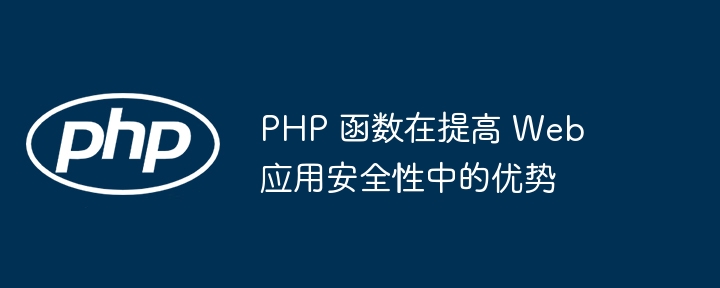Home >Backend Development >PHP Tutorial >The advantages of PHP functions in improving web application security
The advantages of PHP functions in improving web application security
- 王林Original
- 2024-04-25 08:27:021159browse
The main advantages of PHP functions in improving web application security include: Input validation functions: Prevent injection attacks. Output encoding functions: Prevent cross-site scripting attacks. Encryption and hash functions: Store sensitive data securely. Session management functions: Prevent session hijacking and identity theft. CSRF protection function: Prevent cross-site request forgery attacks.

Advantages of PHP functions in improving Web application security
PHP provides many functions for enhancing Web application security. By effectively utilizing these function, developers can protect their applications from a variety of cyberattacks. This article will explore the main advantages of PHP functions in improving application security and illustrate them through practical examples.
1. Input verification
Function:
filter_var()filter_input()htmlspecialchars()
Advantages:
- Verify user Input to prevent malicious code injection.
- Ensure input conforms to the expected format to prevent unexpected behavior.
Actual case:
$email = filter_var($_POST['email'], FILTER_SANITIZE_EMAIL);
if (!filter_var($email, FILTER_VALIDATE_EMAIL)) {
// 抛出错误:无效的电子邮件地址
}2. Output encoding
Function:
htmlspecialchars()- ##htmlentities()
Advantages:
- Prevent cross-site scripting attacks (XSS) by allowing attackers to inject malicious JavaScript code.
- Ensure server-side output is displayed securely on the client.
Practical case:
echo htmlspecialchars($comment); // 转义 HTML 特殊字符 echo htmlentities($comment, ENT_QUOTES); // 转义 HTML 特殊字符和双引号3. Encryption and hashing
Function:
- password_hash()
- md5()
- sha1()
Advantages:
- Securely store user passwords and sensitive data.
- Prevent password guessing and brute force attacks.
Practical case:
$password = password_hash($password, PASSWORD_BCRYPT); // 哈希用户密码 $hash = md5($string); // 计算字符串的 MD5 哈希值4. Session management
Function:
- session_start()
- session_regenerate_id()
Manage user sessions to prevent session hijacking and identity theft.
- Update session ID regularly to enhance security.
session_start(); // 启动会话
$_SESSION['username'] = $username; // 存储用户数据
session_regenerate_id(); // 更新会话 ID
5. CSRF protection
- csrf_token()
Prevent cross-site request forgery (CSRF) attacks, which trick users into submitting malicious requests.
- Generate and validate convincing tokens in forms.
- Practical case:
$token = csrf_token(); // 生成 CSRF 令牌
echo '<input type="hidden" name="token" value="' . $token . '">'; // 在表单中包含令牌
if (!csrf_verify($_REQUEST['token'])) {
// 抛出错误:无效的 CSRF 令牌
}ConclusionPHP functions provide powerful functions to improve the security of web applications. By effectively leveraging these functions, developers can easily implement authentication, encoding, encryption, session management, and CSRF protections. These measures help protect sensitive information, prevent attacks, and enhance the overall security of your application. The above is the detailed content of The advantages of PHP functions in improving web application security. For more information, please follow other related articles on the PHP Chinese website!

